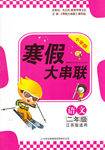题目内容
Everyone needs recognition(赏识) for his achievements,but few people make the need known quite as clearly as the little boy who said to his father,“Let’s play darts(飞镖).I’ll throw and you should say ‘Wonderful!’”
Fran Tarkenton,former Minnesota Vikings quarterback,once called a play that required him to block onrushing tacklers.
FEL quarterbacks almost never block.They’re usually vastly outweighed by defenders,so blocking exposes them to the risk of severe injury.
But the team was behind,and a surprising play was needed.Tarkenton went into block,and the runner scored a touchdown.The Vikings won the game.
Watching the game films with the team the next day,Tarkenton expected a big pat on the back for what he’d done. It never came.
After the meeting,Tarkenton approached coach Bud Grant and asked,“You saw my block,didn’t you,Coach?How come you didn’t say anything about it?”
Grant replied,“Sure,I saw the block.It was great,but you’re always working hard out there,Fran.I figured I didn’t have to tell you.”
“Well,”Tarkenton replied,“if you ever want me to block again,you do!”
【小题1】What does the author intend to tell us in the passage?
| A.Praise can have people take risky actions. |
| B.Encouragement can make people achieve greater progress. |
| C.No recognition,no progress. |
| D.People will be discouraged without praise. |
| A.show the importance of encouragement |
| B.show father’s deep love to the son |
| C.show the boy was complete understanding of his father |
| D.prove the boy was cleverer than the coach |
| A.Quick,brave,exciting. | B.Brave,risky,successful. |
| C.Brave,successful,kind. | D.Fast,clever,strong. |
| A.Recognition. | B.Pride. | C.Cheers. | D.Reward. |
| A.Fran Tarkenton was angry with the coach |
| B.the coach learned a lesson from Fran Tarkenton |
| C.Fran Tarkenton might not take a risk in blocking again |
| D.the coach will highly praise Fran Tarkenton next time he blocks |
【小题1】D
【小题2】A
【小题3】B
【小题4】A
【小题5】C
解析

 寒假大串联黄山书社系列答案
寒假大串联黄山书社系列答案读下面短文,从短文后面各题的A、B、C、D四个选项中,选出适合填入对应空白处的最佳选项,并在答题卡上将该项涂黑。
Every summer a great many students travel to other countries looking for work and adventure. Most of the 26 are in seasonal work, mainly connected with wourism and 27
The pay is usually poor, but most people work abroad for the 28 of travel. You can pick grapes on farms in France, entertain kids on American summer camps, and, of course, there are 29 jobs in hotels and restaurants.
But it is not easy now to find work. “ 30 you speak the language of the country well, there will be very few openings,” says Althea Ellis, an adviser in 31 for students.
“If you work with a family in Italy, you’ll have to speak Italian. When you wash dishes in a restaurant in Pairs, the owner will expect you to speak 32 . British students only have a language 33 for jobs in the USA and Australia.”
34 enjoys the experience. Sarah James was employed to help forty American children in Europe. The two teachers with the children had never been 35 .One child lost his passport; another became seriously ill and was 36 home; the whole group was thrown out of one hotel because of the 37 they made, and what’s worse, Sarah herself was robbed on her only 38 evening of the entire trip. “ I did visit a lot of new places,” she says,“ but it wasn’t worth it. The pay was 39 and it really was a 24-hour-a-day job. The kids never slept!”
“The troubles is, students expect to have a(n) 40 time of it.” Althea Ellis points out. “After all, they see it as a 41 .In practice, 42 ,you have to work hard. At the same time, all vacation work is casual (临时的) work. You’ll have a job when the hotel, the restaurant, or the campsite is busy. In the other words, you’ll work if it’s convenient for the company that 43 you. But you have 44 employment rights. As soon as the holiday season 45 ,they’ll get rid of you.”
|
1. |
A. works |
B. challenges |
C. changes |
D. hardships |
|
2. |
A. service |
B. industry |
C. business |
D. science |
|
3. |
A. pains |
B. comfort |
C. difficulty |
D. excitement |
|
4. |
A. always |
B. hardly |
C. never |
D. seldsom |
|
5. |
A. If |
B. Unless |
C. Because |
D. Although |
|
6. |
A. health care |
B. vacation work |
C. language studies |
D. tourist safely |
|
7. |
A. Italian |
B. English |
C. French |
D. Spanish |
|
8. |
A. chance |
B. ability |
C. possibility |
D. advantage |
|
9. |
A. No one |
B. None |
C. Not everyone |
D. Everybody |
|
10. |
A. abroad |
B. employed |
C. sad |
D. respected |
|
11. |
A. driven |
B. ridden |
C. left |
D. flown |
|
12. |
A. friends |
B. decisions |
C. noise |
D. destruction |
|
13. |
A. busy |
B. free |
C. tiring |
D. pleasant |
|
14. |
A. nice |
B. reasonable |
C. fair |
D. poor |
|
15. |
A. hard |
B. easy |
C. difficult |
D. ordinary |
|
16. |
A. holiday |
B. job |
C. festival |
D. study |
|
17. |
A. besides |
B. therefore |
C. however |
D. meanwhile |
|
18. |
A. fires |
B. employs |
C. recommends |
D. appreciants |
|
19. |
A. few |
B. little |
C. all |
D. much |
|
20. |
A. starts |
B. lasts |
C. approaches |
D. finishes |